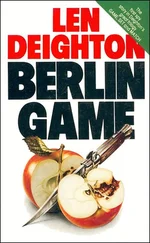Len Deighton - XPD
Здесь есть возможность читать онлайн «Len Deighton - XPD» — ознакомительный отрывок электронной книги совершенно бесплатно, а после прочтения отрывка купить полную версию. В некоторых случаях можно слушать аудио, скачать через торрент в формате fb2 и присутствует краткое содержание. Жанр: Триллер, на английском языке. Описание произведения, (предисловие) а так же отзывы посетителей доступны на портале библиотеки ЛибКат.
- Название:XPD
- Автор:
- Жанр:
- Год:неизвестен
- ISBN:нет данных
- Рейтинг книги:4 / 5. Голосов: 1
-
Избранное:Добавить в избранное
- Отзывы:
-
Ваша оценка:
- 80
- 1
- 2
- 3
- 4
- 5
XPD: краткое содержание, описание и аннотация
Предлагаем к чтению аннотацию, описание, краткое содержание или предисловие (зависит от того, что написал сам автор книги «XPD»). Если вы не нашли необходимую информацию о книге — напишите в комментариях, мы постараемся отыскать её.
XPD — читать онлайн ознакомительный отрывок
Ниже представлен текст книги, разбитый по страницам. Система сохранения места последней прочитанной страницы, позволяет с удобством читать онлайн бесплатно книгу «XPD», без необходимости каждый раз заново искать на чём Вы остановились. Поставьте закладку, и сможете в любой момент перейти на страницу, на которой закончили чтение.
Интервал:
Закладка:
He gave Stuart the brown envelope. ‘And stop worrying about that boy from Washington. It wasn’t your fault.’ Stuart didn’t answer. He knew only too well that it was his fault and that all the reports and reviews would say so.
The man got out. Stuart watched him walk across the park to his own car. It was a hot night and the ease officer took his time. There was a moment or two before the headlights were switched on and another delay before they drove away. Stuart supposed that the section head from London was taking off his false beard.
13
East Anglia is the lost continent of Great Britain. Windy and rainy, it is not a part of the industrialized north nor of the more prosperous south. This is fenland, some of it below sea level, drained by elaborate dykes and ditches built by Dutchmen whose names can still be found in every local telephone directory. No great motorway networks serve this part of England, and grass grows through the train tracks. Here are endless fields of potatoes and peas, ducks and turkeys-all the bounty of the freezer-with rainswept holiday trailers huddled together as if sheltering from the elements. Its horizons are little changed since medieval times, the blunt towers of its flint churches buttressing the turbulent clouds. And yet a short walk off the roadway in almost any direction will bring you to derelict control towers, ruined operations blocks and cracked hardstands. For long, long ago, this was ‘ Little America ’. From here the great bomber fleets went out to attack Hitler’s Germany, and young men from Tacoma to Tallahassee called these East Anglian villages home.
Boyd Stuart saw the spire long before he found the road sign for Little Ashfield. He turned off the Thetford road and went through the villages of Elmstone and Great Wickmondgate. He felt happier in his own car; better an ancient dented Aston, he reasoned, than a factory-fresh Datsun. The village he sought was no more than a dozen small box-framed houses with a flint rubble church. The sky above it was slate grey and there was a trace of rain in the air.
‘I’m looking for Franz Wever’s house,’ Boyd called to an old woman in a floral-patterned pinafore. She was hanging over her garden gate watching her small mongrel puppy gnaw a bone.
‘He’ll be in the church,’ she said. ‘What do you want him for?’
‘In the church?’
She laughed. It was a shrill laugh. ‘The church. Polishing, not praying,’ she said. ‘Every week, regular as clockwork, old Mr Wever is in the church, polishing the pews and sweeping the floor. He’s a dark horse, that one!’
‘Thanks,’ said Stuart, and drove to the end of the village street and parked by the lych gate. It was a fine old church, its great roof a maze of king posts, hammer beams and rafters. Wever was there: a small bespectacled man with a bony pointed nose and thinning fair hair which had still not gone completely white. His eyes were bright blue and his skin untanned but leathery-it was the face of a man who had spent his life outdoors.
‘Mr Wever?’
‘Is it the eggs for the Rendezvous des Gourmets?’
‘Is it what?’
Wever resumed sweeping the floor. ‘I thought you were from the new restaurant on the main road. I had trouble starting my van this morning.’
‘I’m from London, Mr Wever. I was told that you could help me with an inquiry we have about a wartime movement of German archives.’
Wever raised his eyes quickly, his movement frozen. ‘So they sent you,’ he said wearily. ‘Is there no end to their questions?’
‘I have no idea what you are talking about,’ said Stuart.
‘1945 again. That’s it, isn’t it?’
‘Yes.’
‘I’ve told you all I know, over and over again.’ Wever picked up the dustpan and his jacket. ‘Will it take long?’
‘I can’t tell at this stage.’
Wever sighed. Stuart followed him through a vestry door and along a corridor to a broom closet. He watched him collect together his polishing rags and dusters and pack them away. ‘I came here as a prisoner of war in 1945,’ said Wever. ‘I have been here ever since. Always a prisoner, in a manner of speaking.’
‘You regret it now, do you?’ Stuart asked. ‘Prefer the old country?’
Wever looked at him contemptuously. ‘I’ve never been back there, Mr…?’ The German accent was easier to hear now that he was angry.
‘Stuart. Boyd Stuart.’
‘Mr Stuart.’ Wever washed his hands at a small washbasin, dried them carefully and put on an old green tweed jacket and a soft cap.
‘I imagine you have a car, Mr Stuart? My wife is using our vehicle. Friday is a busy day for her. The restaurants, hotels and boarding houses all want our chickens and eggs before the weekend business.’
Wever followed Stuart out to the elderly sports car. He made no comment until the engine started. ‘It has a roar like a tank. Is that what you like?’
‘Yes,’ said Stuart. ‘Which way do we go?’
‘We have twenty-three acres on the back road to Elmstone. Follow this road and turn right after the Red Fox.’
‘Chickens?’
‘ Rhode Islands. We get fine brown eggs from them. People prefer them to white ones but there is no difference really.’ Wever seemed talkative, as if he could keep 1945 at bay by discussing the present day. ‘Nearly lost the whole lot when we began.’ Wever sat silent for a moment. ‘They peck each other to death, you know. We have to chip the beaks off.’
‘Right at the Red Fox, you said?’
Wever did not answer him. ‘We’ve got them in proper batteries now. Factory farming they call it; over two thousand of them, that’s nearly five thousand eggs a week. Then we’ve got a bit of barley. It’s hardly worth the price we get, but it’s insurance. You can be ruined overnight by one of these diseases that the hens get.’
Stuart turned off after the Red Fox, a dilapidated old pub with a broken billboard depicting girls in swimsuits drinking Martini. The countryside was more rolling now: a promise of the sort of landscape that Constable and Cotman found here.
‘A hard life,’ said Stuart after another long silence. He wanted to keep him talking.
‘We have milk from a cow and vegetables from the garden, while a pig provides us with the only meat we get.’ Wever’s English, although imperfect, was precise and sometimes pedantic.
‘He goes to the butcher?’
Wever snorted. ‘Why should I share my meat with a butcher? I kill them myself. I kill all the pigs hereabouts. With four children and only a few acres from which to scratch a living, you cannot be squeamish about killing pigs, mister.’
The Wevers lived in an isolated timber-frame house separated from the road by a quarter of a mile of muddy cart track. The bottom half of the building was of flint rubble construction; the upstairs part was covered in stained and broken weatherboarding. At the back some new brickwork showed where two extra rooms had been added but the toilet was an outdoor shack; there was no mains sewer.
Boyd Stuart parked his car on a gravel patch just off the lane, and they walked up the muddy path between some stunted apple trees and a line of freshly erected beanpoles. Chicken wire was nailed to the front wall so that sweet peas could climb it; their bright pinks and reds made the only colour in the drab landscape. Just outside the front door, there was a collection of rubber boots and a large toy tractor with its front wheels missing. A dog barked at the sound of their footsteps. Wever shouted to it but the barking continued.
Mrs Wever was already at home. She was a muscular woman; ruddy cheeked and bucolic, she was about ten years younger than her husband. Her dark hair was drawn tightly back into a bun, and her eyes were quick and clear. She was making pastry on the kitchen table, measuring flour and chopping butter with the speed that comes with boredom and impatience.
Читать дальшеИнтервал:
Закладка:
Похожие книги на «XPD»
Представляем Вашему вниманию похожие книги на «XPD» списком для выбора. Мы отобрали схожую по названию и смыслу литературу в надежде предоставить читателям больше вариантов отыскать новые, интересные, ещё непрочитанные произведения.
Обсуждение, отзывы о книге «XPD» и просто собственные мнения читателей. Оставьте ваши комментарии, напишите, что Вы думаете о произведении, его смысле или главных героях. Укажите что конкретно понравилось, а что нет, и почему Вы так считаете.












